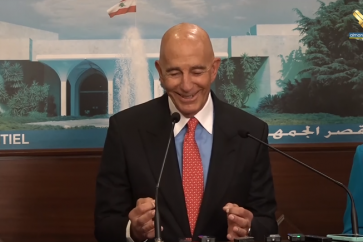The US Senate on Thursday sustained President Donald Trump’s veto of a resolution demanding an end to military support for the Saudi-led coalition waging war in Yemen, in a victory for the White House’s policy of continued backing for the kingdom.
The vote was 53 to 45, falling short of the two-thirds majority needed to override a veto, despite a handful of Trump’s fellow Republicans joining Democrats in backing the war powers resolution.
It was only the second veto of Trump’s presidency, both this year. Neither has garnered the two-thirds support in both the Senate and the House of Representatives needed to override.
The resolution’s passage earlier this year marked the first time both the Senate and House supported the provision of the War Powers Act limiting the president’s ability to send troops into action without congressional authorization.
Backers of the resolution said they wanted to reassert Congress constitutional power to declare war, and send a strong message to Saudi Arabia about the devastating civilian toll of the four-year-long war on Yemen.
“We’ve been materially assisting a foreign power in its efforts to bomb its adversaries. And sometimes helping that foreign power to bomb innocent civilians on the ground in the process,” Republican Senator Mike Lee, a co-sponsor of the resolution, said before the vote.
Many members of Congress have also become increasingly frustrated with Saudi Arabia over its human rights record, anger fueled by the murder at a Saudi consulate in Turkey last year of journalist Jamal Khashoggi, a US resident and columnist for the Washington Post.
Resolution opponents argued that support for the Saudi-led coalition was not an appropriate use of the War Powers Act, because the military provides supports such as targeting assistance, not troops.
“The premise of this resolution is fundamentally flawed and I believe a misrepresentation of what is happening on the ground in Yemen,” Republican Senator Jim Risch said before the vote.
Yemen has been since March 2015 under brutal aggression by Saudi-led Coalition, in a bid to restore control to fugitive president Abd Rabbu Mansour Hadi who is Riyadh’s ally.
Tens of thousands of people have been killed and injured in the strikes launched by the coalition, with the vast majority of them are civilians.
The coalition, which includes in addition to Saudi Arabia and UAE: Bahrain, Egypt, Morocco, Jordan, Sudan and Kuwait, has been also imposing a harsh blockade against Yemenis.
Source: Reuters




